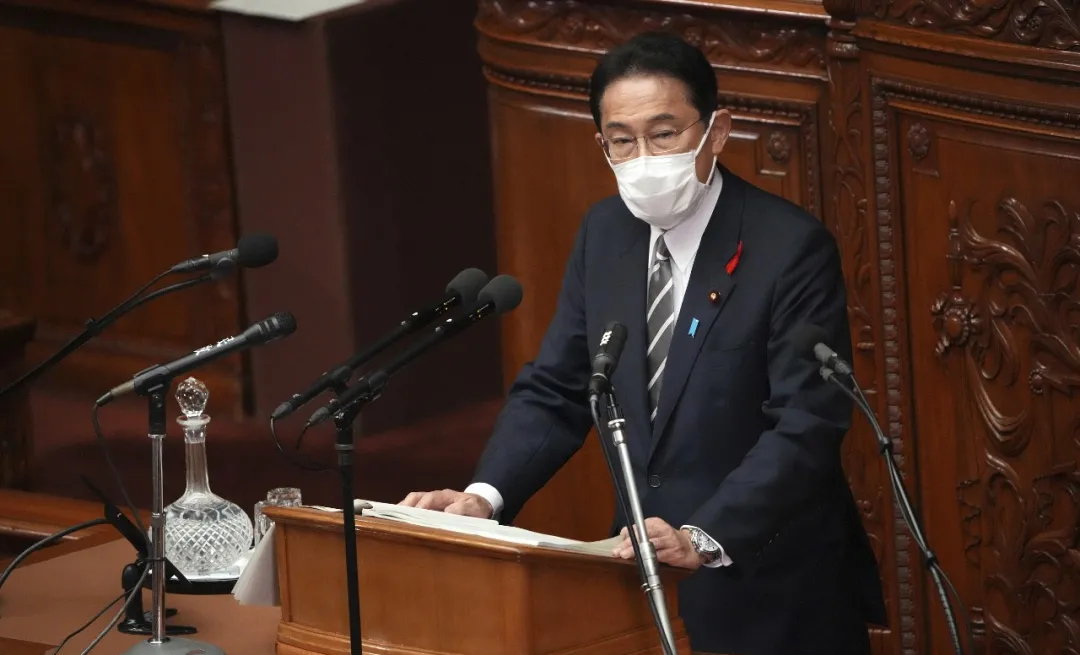According to Kyodo News Agency, Japan's new Prime Minister Kishida Fumio delivered his first policy speech after taking office at the plenary meeting of the House of Representatives on the afternoon of the 8th, proposing that responding to the new crown epidemic will become the primary issue, advocating "new capitalism" to protect the middle class, and emphasizing the realization of a "nuclear-weapon-free world".
Governor Chang'an Avenue noted that when talking about foreign and security policies, Kishida said that maintaining stable Japan-China relations is important for both the region and the international community, but that Japan will work with like-minded countries to "say what should be said" and demand that China take responsible action. At the same time, we will continue to engage in dialogue with China and cooperate on various common issues.

Kishida Fumio delivered a speech in the Japanese Diet on the 8th
In his speech, Kishida proposed that he would work on revising the National Security Strategy, the Outline of the Defense Plan, and the Medium-term Defense Improvement Plan, formulate bills related to economic security, and build a strong supply chain.
He also stressed the need to work with partners including the Quad Security Dialogue (QUAD) to advance a "free and open Indo-Pacific region."
Regarding Japan-U.S. relations, Kishida called the Japan-U.S. alliance "the cornerstone of world peace and prosperity" and will continue to deepen.
Regarding Japan-Russia relations, Kishida said it is impossible to sign a peace treaty without first resolving the decades-long territorial dispute, and he hopes to establish contacts with Russian President Vladimir Putin and promote negotiations.
Born in Hiroshima, he also said Japan would serve as a bridge between nuclear-weapon states and non-nuclear-weapon states in an effort to achieve "a world without nuclear weapons."
The above statement is basically consistent with the content of the draft previously revealed by the Japanese media. Kyodo News Agency reported on the 7th that Kishida will continue the "Abe/Suga Yoshihide line" in foreign policy, deepen the Japan-US alliance, vigorously promote the concept of "a free and open Indo-Pacific", and "adhere to the due proposition and strongly demand that (China) take responsible action" while promoting continuous dialogue with China.
Some analysts believe that because Kishida has had foreign ministerial experience, his China policy is not expected to be as negative as Suga's, but will promote cooperation with China in economic and trade cooperation and people-to-people exchanges. The contents of his policy address, which deal with china's diplomacy, are also more in line with this prediction.
In terms of internal affairs, Kishida said in his policy address that he will make the response to the new crown epidemic a top priority, including promoting the preparation of the third dose of vaccination, putting oral therapeutic drugs into practical use within the year, electronic vaccination certificates, and expanding free testing.
On economic policy, Kishida reiterated his determination to overcome deflation, saying he would continue to pursue bold monetary easing, flexible fiscal spending, and a growth-promoting strategy. In his speech, he did not specify the scale of the plan to revitalize the economy, but he proposed a stimulus package totaling 30 trillion yen last month. The new finance minister, Shunichi Suzuki, revealed after a cabinet meeting that Kishida had instructed him to prepare additional economic budgets to help the country recover from the outbreak.
On the issue of constitutional amendment, Kishida said that he would hold constructive discussions through the Constitutional Review Meeting of the National Assembly and promote open discussions for the public.
The governor of Chang'an Avenue noted that Kyodo News agency had previously pointed out that the Kishida cabinet had hidden concerns as soon as it came to power, and there were already voices of resentment within the Liberal Democratic Party.
The report pointed out that the personnel arrangements of the Kishida cabinet did not conceal the merits and deeds of their own camps, and the factions in the LDP that did not obtain important positions were full of dissatisfaction, especially the minister in charge of administrative reform, Kono Taro, who was defeated in the election, was "demoted" to the head of the Liberal Democratic Party's Broadcasting Bureau, which caused complaints.
Kishida Cabinet group photo
On April 5, Kyodo News Agency conducted a national emergency telephone public opinion survey in Japan, and the results showed that the Kishida Cabinet supported 55.7% and the non-support rate was 23.7%.
Among them, 69.7% of respondents believe that Kishida Fumio "should change" the line of former prime ministers Shinzo Abe and Suga.
Regarding the issues on which the Kishida Cabinet should be working on the highest priority, the largest number of responses to the COVID-19 response and economic policies accounted for 27.9%.
In response to the "Moritomo Gakuen" scandal involving Shinzo Abe, 62.8% of the respondents believe that "it should be re-investigated."